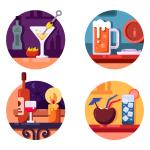A few weeks ago, the media ran wild with an outlandish claim that an extra glass of wine will take 30 minutes off of your life.
alcohol
Alcohol is bad again. Sometimes, epidemiologists tell us it's good, but today, they're telling us it's bad. What else is bad? The study that arrived at that conclusion.
A new analysis by 24/7 Wall St., reprinted in part by
Recently, while watching television, I came across a cast reunion show for the reality series Real Housewives of Orange County (RHOC) on the Bravo network.
Pregnancy is an exciting time for parents-to-be. Pregnancy also means letting go of some of your favorite things.
If you read only the headlines this past weekend, your holiday festivities might have been less fun, since the message seemed to be that consuming any amount of alcohol was a certain precursor to developing breast cancer.
Full Disclosure: Before five minutes ago, I was unsure what teams made it into the upcoming Super Bowl. I mean, if one of them isn’t the Eagles, then my attention span plummets to nonexistent.
Hand sanitizers are ubiquitous. They are used by staff in hospitals, and many people keep a small bottle of hand sanitizer in their bags or purses.
What goes up must come down. There is no top without a bottom. Two sides to every coin. No front without a back. A lid without a pot. My cliche list is endless. So, I will stop torturing you.
Depending on who's consuming it, alcohol affects different people in very different ways. And to go along with that, drinking stereotypes are never in short supply.











